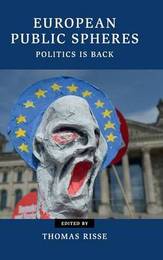
|
European Public Spheres: Politics Is Back
Hardback
Main Details
| Title |
European Public Spheres: Politics Is Back
|
| Authors and Contributors |
Edited by Thomas Risse
|
| Series | Contemporary European Politics |
|---|
| Physical Properties |
| Format:Hardback | | Pages:316 | | Dimensions(mm): Height 229,Width 152 |
|
| ISBN/Barcode |
9781107081659
|
| Classifications | Dewey:320.94 |
|---|
| Audience | | Professional & Vocational | |
|---|
| Illustrations |
26 Tables, black and white; 24 Line drawings, black and white
|
|
Publishing Details |
| Publisher |
Cambridge University Press
|
| Imprint |
Cambridge University Press
|
| Publication Date |
13 November 2014 |
| Publication Country |
United Kingdom
|
Description
The Euro crisis has led to an unprecedented Europeanization and politicization of public spheres across the continent. In this volume, leading scholars make two claims. First, they suggest that transnational crossborder communication in Europe has been encouraged through the gradual Europeanization of national as well as issue-specific public spheres. Second, the politicization of European affairs - at the European Union (EU) level and in the domestic politics of member states - is inevitable and here to stay. Europeanized public spheres, whether elite media, mass media, or social media such as the internet, provide the arenas in which the politicization of European and EU issues takes place. European Public Spheres explores the history of these developments, the nature of politicization in the public spheres as well as its likely consequences, and the normative implications for European public life.
Author Biography
Thomas Risse is Professor of International Politics at the Otto Suhr Institute of Political Science at the Freie Universitat Berlin as well as co-ordinator of the Research Center 700 'Governance of Areas of Limited Statehood' and co-director of the Research College 'Transformative Power of Europe', both funded by the German Research Foundation (DFG). He is one of the world's leading scholars of the international politics of European integration and his publications include A Community of Europeans? Transnational Identities and Public Spheres (2010), The Persistent Power of Human Rights: From Commitment to Compliance (Cambridge, 2013, co-edited with Stephen C. Ropp and Kathryn Sikkink), External Actors, State-Building and Service Provision in Areas of Limited Statehood (2014, with Stephen D. Krasner) and Handbook of International Relations, 2nd edition (2013).
Reviews'Based on analytically and methodologically diverse, sophisticated and lively contributions, Thomas Risse and a group of leading scholars in this superb collection develop one powerful claim: the Europeanization of national and issue-specific publics is here to stay. Both indirectly and directly, Europeanization affects identities and interests that may be fragmenting or integrating but are always contested and profoundly political. For scholars who believe that public opinion research is the only way of thinking about the public, here is a powerful reminder from Europe that it is high time to think again.' Peter J. Katzenstein, Walter S. Carpenter, Jr Professor of International Studies, Cornell University 'This groundbreaking book brings together a top-notch group of scholars whose work has been at the forefront of research on the politics of the European public sphere. Their chapters are 'state of the art' in terms of theories of communication, methodological design, and substantive insights about the consequences of the politicization of the European public sphere for legitimacy, identity, citizenship and democracy. A 'must-read' for all those interested in questions related to the politicization of European affairs and the Europeanization of national public spheres.' Vivien A. Schmidt, Jean Monnet Professor of European Integration, Boston College 'In European Public Spheres, Thomas Risse has gathered the best scholars in the field. They take stock and show with a variety of different methods that Europeanization takes place - yet not in the form of a new, supranational layer, but rather as politicization of the EU in already existing spheres. Moreover, the volume significantly improves our understanding of the relationship between Europeanization and European identity. A splendid book on the rise of societal foundations for a new polity.' Michael Zurn, WZB (Social Science Center Berlin) and Freie Universitat Berlin
|